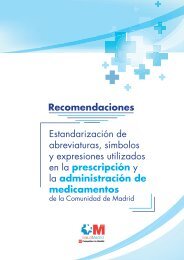lKd7nD
lKd7nD
lKd7nD
You also want an ePaper? Increase the reach of your titles
YUMPU automatically turns print PDFs into web optimized ePapers that Google loves.
An Act of Imagination<br />
Philip Boehm<br />
In truth I am an impostor, a<br />
theater director masquerading as<br />
a translator. (Incidentally the fact<br />
I consider translation my “day<br />
job” says a lot about working<br />
in the theater.) And over the<br />
years I’ve come to the conclusion<br />
that the two trades have a lot<br />
in common. They both involve<br />
taking a written text from one<br />
place to another. And they both<br />
begin with an act of imagination.<br />
Theater always happens<br />
right here and now: the live<br />
event is what moves the audience<br />
to laugh or cry or walk out dazed. The written play is all about<br />
potential, much like a musical score or perhaps a chemical<br />
formula that tells us when A comes into contact with B there will<br />
be a release of energy. The director’s job is to summon the world<br />
of the play onstage and catalyze that release.<br />
Translators do much the same thing: we first distill the<br />
potential of the original, then conjure its world in another<br />
language, another time, another place. And both translators and<br />
directors have to cope with a shifting cultural context. Plays by<br />
Tennessee Williams seem quite concrete in St. Louis but a bit<br />
more abstract in Kyoto. Kafka’s Trial was read differently by<br />
Eastern European dissidents than by American professors. And<br />
when Joseph Brodsky toured as Poet Laureate of the United<br />
States, he would read the same poem in Russian and in English,<br />
shifting from fairly flat delivery for the former to dramatic<br />
declamation more suited to his native tongue.<br />
Every performance requires long periods of training and<br />
rehearsal to ensure that it stays grounded in the reality being<br />
created on stage. Such grounding is also essential work for<br />
translators, so that the re-creation of the original text remains<br />
so securely and deeply rooted that it can achieve a life of its<br />
own. Clearly the first step in this process is to understand the<br />
language of the original—and not merely vocabulary, syntax,<br />
and grammar, but the personality of that language.<br />
For example, working in German, I am constantly amazed<br />
The Art of Empathy: Celebrating Literature in Translation<br />
25



